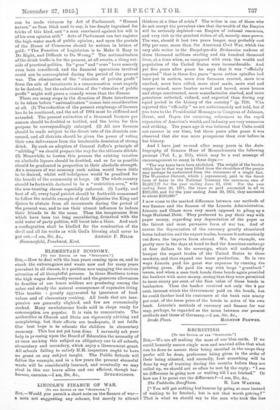LINCOLN'S FINANCE OF WAR.
/7'0 TUN EDITOR OF Ting "SPZOTAT01.1
Sin,—Would you permit a short note on the finance of war— a note not suggesting any scheme, but merely to attract
thinkers at a time of crisis I) The writer is one of those who do not accept the prevalent view that the wealth of the Empire will be seriously depleted—an Empire of colossal resources,
and very rich in the greatest riches of all, namely, man-power. The war, should it last two years longer, may probably cost fifty per cent. more than the American Civil War, which the very able writer in the Encyclopaedia Britannica reckons at three thousand millions sterling and six hundred thousand lives, at a time when, as compared with ours, the wealth and population of the United States were inconsiderable. And yet five years after peace he says that it was " officially reported" that in those five years "more cotton spindles had been put in motion, more iron furnaces erected, more iron smelted, more bars rolled, more steel made, more octal and
copper mined, more lumber sawed and hewed, more houses and shops constructed, more manufactories started, and more petroleum collected, refined, and exported than during any equal period in the history of the country" (p. 719). Who reported this "officially" we are unfortunately not told, but if you turn to the Presidential Messages to Congress of Johnson, Grant, and Hayes the recurring references to the rapid expansion of America's wealth and industry are very numerous and striking. Ten years ago it was believed that Cuba could not recover in our time, but three years after peace it was observed that she was more prosperous than ever before in her history.
And I have just re-read after many years in the Auto- biography of Senator Hoar of Massachusetts the following
passage (Vol. I., p. 251), which may be a real message of encouragement to many in these days :—
"The war taxes have been abolished. The weight of the burden which has in that way been lifted from the shoulders of the people may perhaps be understood from the statement of a single fact. The Worcester District, which I represented, paid in the direct form of taxes to the National Treasury the enormous sum of $3,662,727 for the year ending June 30, 1866. For the year ending June 30, 1871, the taxes an paid amounted in all to $222,000, and for the year ending June 30, 1872, they amounted to about $100,000."
I now come to the marked difference between our methods of
war finance and the finance of the Lincoln Administration. Lincoln and Chase were very much opposed to piling up a huge National Debt. They preferred to pay their way with paper money, regarding any depreciation of the paper as
the fairest and most pervasive form of war tar. And of course the depreciation of the currency greatly stimulated home industries and the export trades, because it automatically cut down the imports from abroad. We, for example, are pretty sure in the days at band to find the American exchange at four dollars to the sovereign, which will undoubtedly hamper the export trades of the United States to these markets, and thus expand our home production. So in two ways Lincoln paid his great war expenses by running the printing press. He paid his way with large " greenback " issues, and when a man took bonds these bonds again provided the bankers with more money, seeing that they were permitted to issue ninety per cent, of the face value of these bonds in banknotes. Thus the banker received not only the 4 per cent. interest which the Government paid on the bonds, but be could further lend his customers at the bank rate ninety per cent. of the issue price of the bonds in notes of his own bank. Lincoln's methods of currency and finance for war may, perhaps, be regarded as the mean between our present methods and those of Germany.-1 am, Sir, Ac.,






































 Previous page
Previous page